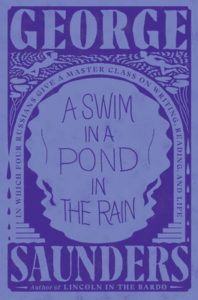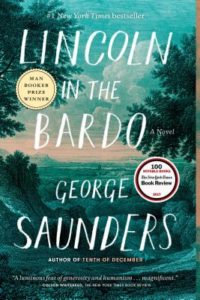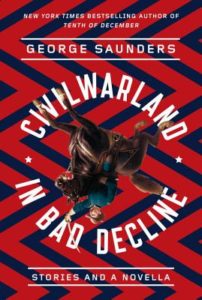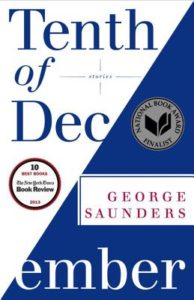
There’ve been plenty of books on craft published by acclaimed writers before A Swim in a Pond in the Rain, but none have been infused with such belief in the capacity of fiction to change its readers, such revelation of the tricks of the craft, or such empathy for future writers. George Saunders has been a professor for Syracuse’s MFA program since 1997, throughout which he’s taught a class on Russian short stories in translation. The course is intended not as a survey of the Russian short story, but rather a way to close-read these giants of literature in order to glean lessons of craft. The goal is to understand the short story itself, to learn how a good story works, and discover what you (as a writer) value in fiction.
With A Swim in a Pond in the Rain, Saunders’ latest book, these university lessons are imparted upon readers across the country. Featuring seven short stories by Gogol, Tolstoy, Chekhov, and Turgenov, as well as accompanying essays offering close line readings and discoveries made by Saunders and his students over the years, the book shows us how far the Russians went to master the short story form and invites us to interrogate what sells us on those stories. Saunders kindly agreed to an interview with MAYDAY, during which he discussed the lessons to be learned from embracing the “Shit, I’m Not So Sure Anymore” territory, comparing authors’ lesser works, and trusting our thousands of intuitive decisions as writers.
This interview has been edited for brevity and clarity.

Brianna Di Monda: You say in the introduction of A Swim in a Pond in the Rain that “our time maybe doesn’t fully endorse” what “these writers accepted implicitly as the aim of art—namely, to ask the big questions.” How, to you, has the aim of art evolved since the time of these Russian masters? Why does our time (maybe) no longer fully endorse asking the big questions?
George Saunders: I’m really not sure, to be honest. My hunch is that, like so much these days, it might have something to do with the gradual rise and dominance of materialism and corporate capitalism—the story being understood, now, as more “product” than exploratory tool. But it might just be personal too—my notion of a story being more in line with the old Russian one. But, if I might be allowed a big generalization—I do think there’s something in the Russian psyche that inclines to the big and philosophical and tragic. I was there once, long ago, in 1982, and got invited to party by some people my age—early twenties, at that point. And the whole party was, basically: vodka and ideas. How should we live? Capitalism vs communism. Beatles vs Bach. I felt I’d died and gone to heaven. At one point, this guy—a venereologist, as I recall (“A good doctor for bad diseases,” he said) stood up and recited from George Bernard Shaw, from memory, for about ten minutes. And it occurred to me that one of the beneficial side-effects of oppressive communism was a relative paucity of distractions.
BD: Definitely, definitely. And perhaps seeing art as a product inherently diminishes its power as a moral-ethical tool. I’m thinking of how this commodification has happened to the visual arts, and specifically how Black art has become a “must-have” in every private collection. It’s great that these artists are gaining more recognition, but in an (read: my) ideal world, a collection would reflect that person’s interests, and not be bought as part of an investment portfolio. Of course, I don’t want to generalize and say that art functions better under communism (every market will demand something of its artists), but I will say that after spending a year in quarantine, no American I know can recite Shaw for ten minutes–we’re all spending too much time on TikTok (hmm, another commodified art?).
You also mention in the essay “A Page at a Time” that “Chekhov once said, ‘Art doesn’t have to solve problems, it only has to formulate them correctly.’ ‘Formulate them correctly’ might be taken to mean: ‘make us feel the problem fully, without denying any part of it.’” Is this aim still true of art? To simply expose problems and ask questions, without trying to solve them? To keep us wondering?
GS: Well, I think every artist has to decide for herself, of course. It’s funny—if a person has a particular belief regarding what art should do, and really lives into that—it will work. Because she will make it work. That is, she’ll feel the way it’s not working (where, say, it’s rhetorically unsupported) and will correct that. In that process, I think the artist usually finds that the original intention she had has been challenged.
Any form (the short story, say) has inherent constraints—things it prefers that we do, let’s say. The story form, in my view, prefers what I call in the book “on the other hand” thinking. It’s very smart, the form, and has a way of shining a light on parts of our thinking that are incomplete or biased. So, if a person wrote a story in which she intended to solve a certain problem (and, maybe, she had some predetermined idea of what that solution would look like), I suspect that the form would resist that. To my way of thinking, a good story complicates things, in the direction of making some original, simple solution feel (merely) partial. Elsewhere in the book I reference an Einstein quote: “No worthy problem is ever solved in the plane of its original conception.” In other words, to the extent that we know where a story is going, and it just . . . goes there, well, there’s a sense of disappointment.
This doesn’t mean, though, that a story can’t be revolutionary or morally intense. It just means that sometimes the most revolutionary and morally intense journey is one that pushes us out into a space of ambiguity, by which I mean, a place where our sturdy, go-to solutions—our habitual moral stance—gets challenged, and we find ourselves propelled into the sacred land of “Shit, I’m Not So Sure Anymore.”
BD: I remember you talking about the plane of original conception—it was in your discussion of “The Nose” by Gogol. It was in reading it that essay that I was first introduced to this idea, and all I could think was, damn, he’s exactly right. Because it is too predictable to write that way; writers can’t try too hard to push language past its limits, they have to let language push them. And, like all the best ideas, it’s so obvious once it’s been stated.
To go off this, you spend a lot of time discussing what you call the “psychological physics” of “The Nose,” and how this story is often impossible to visualize. You say:
What does it mean that all of this now, sort of, is? It means that language can make worlds that don’t and never could exist. Reading Gogol, it may occur to us that this is what our mind is doing all the time: making, with words, a world that doesn’t quite exist.
This articulates why I love surrealism, including the surrealist elements of your work. To briefly turn to Lincoln in the Bardo, Roger Bevins II is a difficult character to visualize because the number of limbs and sensory organs he has changes, and you (like Gogol) don’t bother describing precisely how these extraneous body parts appear, disappear, fit on his body/face, etc. Do you think, on some level, you drew upon Gogol when you created this character?

GS: Yes, I expect so, because Gogol is so important to me. That whole move, of saying something, in a sentence, and then expecting/demanding that the reader supply it, is something I’m really fond of. (“The enthusiasm, losing its shoe, began to weep.”) I was also feeling a lot of Miyazaki, I think, in that book—the way that there will be some strange thing (a giant baby, a puff of smoke with a face) and then that thing becomes metaphorical, just by existing and being made to complete certain actions and so on. And the nature of that metaphor will be shifting and ambiguous—it means something but we can’t say what, exactly, or too neatly.
With all of those bardo beings, the game was to try to find a physical (or sometimes linguistic) corollary for what ailed them, i.e., what was keeping them in the bardo. So, with Bevins, my mental process went something like: “His main trope is that he longs for the things of this world; what might his body do in response to that desire?” And then the answer was to make him this sort of Shiva-like guy, with countless organs for experiencing the things of the world (if he can ever get back there).
BD: I see that. Reading Miyazaki would, I think, be akin to reading Gogol or Lincoln in the Bardo. His films hold a similar place in my heart, despite dealing with such a different medium.
One more question about Lincoln in the Bardo: The historic accounts in the novel often contradict each other about basic facts—early on, you have a lovely chapter dedicated to excerpts describing the moon on the evening of Willie’s death, but these historical accounts aren’t consistent in their descriptions. The reader is taken through a series of paragraphs stating the moon was full, then a crescent, then a new moon, then golden, then red, then obscured by clouds . . . the inconsistency in the chapter really set the tone for how much this book is about to “find new paths for writing” (to quote you from A Swim). My question is: Why did you choose to include these contradictory statements, here and elsewhere in the novel? Is it meant to speak to something greater about truth or the impossibility of knowing what happened that night? Or perhaps the inconsistencies in the nonfiction are meant to serve a different purpose, like lend credence to the fictional chapters? Or something else altogether?
GS: Well, the most honest answer is that I stumbled on it and liked it. The stumbling was probably caused somewhat by my having seen similar patterns in the (real) historical documents—outright contradictions but also that feeling of hearing the same event described by two different narrators; the different emphases placed and so on. But that “stumbling on it and liking it” thing is very real for me and very important. I think what’s happening is that I’m “liking” it on the level of . . . let’s call it surface progress. I like the way it sounds and feels. Then, liking it, I expand upon it (still not worrying about what it means). For me, this is the mode where good stuff happens. Those thousands of intuitive decisions. Then, later, I might think, “Ah, this says something about the unreliability of historical narrative which, in turn, is about impermanence, really—the feeling that there is no reliable narrator and that all of those unreliable narrators are describing things that only ‘happened’ within each narrator’s consciousness, and also that all the things they are describing so variously (people, meals, buildings, moments) are all gone now anyway.”
BD: So the decisions are made on the intuitive level first, and then you turn around and recognize those potentially loftier meanings embedded in what you wrote. That definitely seemed to be one of the major lessons you shared in A Swim: how all art occurs in those instances of intuitive decisions. You build upon this idea to say that the whole process is, essentially, intuition plus iteration. That is, trusting that those thousands of line-level decisions are making the piece better. Then, in “Afterthought #7,” you conclude by saying:
We’ve been comparing the pre-reading state of our minds to the post-reading state. And that’s what fiction does: it causes an incremental change in the state of a mind. That’s it. But, you know—it really does it. That change is finite but real. And that’s not nothing. It’s not everything, but it’s not nothing.
This take on reading parallels your advice on writing, as here you say that the impact on the reader also happens incrementally. Do you believe the job of a reader mirrors that of a writer? To read/write one line at a time and trust those intuitive reactions/decisions?
GS: Yes, or, you know—that’s how we read, not by choice but by nature. We read a little swath of text and, after it, are in a different place than we where we started. We can trust, or bless, that reaction (assuming, of course, that we’ve read enough in our lives). And, to my way of thinking, that’s where criticism begins: we have an honest reaction and try to articulate it. This process pertains to a reader trying to understand a novel and to a person in a theater trying to understand a movie, and to a person in an art gallery looking at a painting. “Where has the artist just put me?” we might ask. “What has she just done to me?” We’ve been prepped for something, or been sensitized to something; we’re now expecting something. The whole process of experiencing a work of art can be reduced to this: be in place A, read, be moved to place B, read (repeat until the end of the work of art).
And, of course, this ability to accept and bless an authentic reaction has a corollary in real life too. We live a moment, have a reaction, accept/bless that reaction. The result might be an increased confidence in our ability to handle things; to accept whatever happens with minimal denial, let’s say.
I might just also underscore that we can trust those initial reactions to the extent that we’ve taken the trouble to refine them; in the case of reading, that means reading widely and also reading criticism, to see how others have thought and written about books you’ve read—this might be seen as a form of honing your reaction.
BD: It’s like . . . extra life lessons that come from genuine engagement with art. And, like life, you get more out of it when you engage more critically, more thoughtfully. Then in honing your reaction to others’ art, you’re probably getting better at critically responding to your own, and therefore developing your artistic talent. In “Afterthought #6,” you mention that Tolstoy wrote a story based on his experience as a passenger in a sled that got lost in a snowstorm, using that same material forty years later to write “Master and Man” (one of the stories discussed in A Swim). You say that “to read those two stories in sequence is to get a glimpse of what Tolstoy had learned about narrative in the intervening forty years.” Do you have any pairs of stories (published or unpublished) that you’ve looked back on and recognized your own growth as a writer? If so, are you willing to share a moment in which you’ve looked back and realized your writing had matured?

GS: Well, if I read basically anything before “CivilWarLand in Bad Decline” I see a big leap forward, mostly having to do with what I thought writing was. Before that book I thought it was a way of proving that you knew something or had been somewhere cool – proof of your superiority, I guess, or your sophistication. It was world-weary writing (though I was still only in my twenties). With that first book, I changed my ideas—suddenly I was just trying to make each sentence have its own kind of alertness, and I’d decided that entertaining/engaging the reader was the priority. There was a static, preachy quality in that older work, and the stories each ended with this sort of wry, “Ah, sad world,” feeling that wasn’t very authentic. Nothing funny in the stories, nothing unexpected happening, everything under my control. So the real move forward came when I sort of agreed to be a participant in my own story, not just the stage manager of it, if you see what I mean—to be authentically involved in the story with curiosity, trying to respond to the actual energy I’d (maybe inadvertently) created.
BD: I see that. That kind of growth—where you learn to let go—is, I think, so necessary for people to find their voice as writers and artists. It sounds like “CivilWarLand” is when you first started letting yourself enter the “Shit, I’m Not So Sure Anymore” territory you referred to earlier. Now, there is something so sure and nostalgic in the way you speak about writing in A Swim. You can tell it was written by someone who has spent decades teaching and writing and is looking back on those years with a degree of completion. (Though not with finality, as you also state your desire to continue to find “new paths for the story form.”) Do you think you could have written this book earlier in your life, or is it too strongly informed by your accumulated experience? How might it have looked differently had you published it, say, a decade or two earlier?
GS: I don’t think I could have written it ten years ago, no. And twenty, no way. What changed, I think, was that I became a more confident writer of essays and maybe a more confident writer in general. That book took a certain calmness that I didn’t have when I was younger, a willingness to not have to be proving something in every line. One of my little mantras as I was writing it went something like, “It’s all about the Russians.” So that was nice, actually, to understand the prose as being in service to something (i.e., trying to see what the stories were doing and present it in such a way that the reader could understand what I was talking about). I think it also helped that I’d taught the class so many times; I had a pretty good idea of where the meat was, with each story, and what had taught well over the years. So, for example, knowing that “The Singers,” by Turgenev, always met with a little resistance in the context of the class, was helpful. I could fold that knowledge into the essay.
BD: That calmness definitely comes through in your essays. And I’m sure having taught this class many times before helped inform that. You’ve taught at Syracuse for nearly a quarter of a century, teaching dozens of classes in your time as a professor. Why, out of all your courses, did you choose this one to turn into a book?
GS: This was the class I always loved teaching the most and (not unrelatedly) the one that students seemed to respond to the most positively. Over those twenty years of teaching it there were so many wonderful moments, where the distinction between teacher and students vanished and we all suddenly learned something together or (better still) worked our way into some unanswerable question about art or stories, sometimes, even life itself. So, I just sort of felt that it would be cool (and fun) to formalize some of what I (we’d) learned.
BD: Sure, you reference those distinctions breaking down often in A Swim, even referencing takeaways you got from the students, not just the Russians. Since you’ve compiled so many of the primary takeaways from the course here, will you continue to teach this class after having published this book? Might the students anticipate your lessons and discussions by reading this book before (or throughout) the semester?
GS: Well, that’s the interesting thing—I may never teach it again. My teaching is now just the six-person workshop each fall. So, retrospectively now, I’m thinking that this might be another reason I decided to write the book. It hadn’t occurred to me when I started the book. But . . . if I ever do teach it again, I’ll use all different Russian stories. There are so many good ones.
I’ve often thought that a good class might be “Lesser Stories”—stories by great writers that somehow didn’t come together. There would be some good lessons in that. Also “Fatal Moments”—a collection of examples where a story goes off because of a bad choice at a critical moment. I’ve taught one called “Book to Film,” in which we looked at famous adaptations and so on. There’s so much to know . . .

BD: I didn’t realize you were just teaching the workshop! It’s a good way to memorialize that class, then. Why the smaller course load at the moment? And all three of those classes sound great, especially for students at the MFA level. There’s so much time spent on learning from masters, when there’s just as much to be learned from lesser works. I liked your discussion of Turgenov for that reason. If you don’t mind sharing, what are some of the stories you think you’d teach in “Fatal Moments” or “Lesser Stories”? But, yes, there’s so much to know and so many ways to learn. It’s a bit overwhelming, really.
GS: I basically have been working toward doing less teaching in order to be able to undertake some bigger writing projects.
For “Lesser Stories,” one I’d teach is “The Nameday Party” by Chekhov, which is a good story but not, I’d say, at the same level of his greatest works. I mean, it’s a really good story—better than most of us could write in a lifetime—and yet . . . And the interesting question would be, well—what’s the difference between say, “Lady with Pet Dog” and that story? I might also teach “The Snowstorm,” by Tolstoy, which I mention in the book—an early use of the material he later used for the truly great story “Master and Man.” For “Fatal Moments”—that idea came from a couple of movies we’ve recently watched which, out of courtesy, I’d rather not name. Somehow those moments are easier to see in movies, I think.
BD: Those make sense to compare in that context—thanks for sharing. Ok, I’m at my last question. You have a paragraph in “The Door to the Truth Might be Strangeness” about the poetry of corporate jargon:
When a corporate person says, “The stress being felt by some is, in terms of how we might view it is, we did not meet or exceed our goals that we all will remember Mark from corporate communicated so clear last month in his critical missive,” that is a poem, because it is not right. There’s a true statement inside it (“We failed and we are fucked”), but there’s also something true about its not-rightness, the flavor which tells us things about the speaker and his culture that aren’t conveyed by “We failed and are fucked.”
So, it’s a poem: a machine for conveying bonus meaning.
My (last, cheeky) question to you is: Is all indirect language poetry?
GS: In my view, what makes that corporate passage poetic (poetic-ish) is not the indirection only, but the flavor of the indirection. It tells us something about the author’s positioning. He is working so hard not to say “We failed and we are fucked” that he is unintentionally saying something else. (“My position is in jeopardy.”)
If someone is expressing himself inefficiently, that tells us something about his view of the world. Sometimes, as in the above example, the inefficient expression is quasi-intentional and has to do with suppression—I need to say a certain thing, but don’t want to and so I decide to cleverly talk around it. (There’s a famous example in which an SS agent refers to the Jewish prisoners in a boxcar as “the items” and, in extreme passive voice, reaches the conclusion that, in order that the items not become agitated, the lights should not be turned on when the train enters a station.) Other times, it’s sort of a natural product of the world that produced the person. So, for example, if someone is always talking in chirpy faux-positive cliches (like some of the characters in Flannery O’Connor’s stories, say), we might wonder why. Why such an energetic effort to avoid engaging with the moment? And actually, that’s also a form of suppression.
So, in fiction, I’m always alert to the idea that an inarticulate voice, tuned, can offer me another way to express character. The guy who says, “Craig, you’re a terrible worker and you’re fired,” is a different guy than the one who says, “There are times, in life, when paths, albeit both mutually wonderful paths, must diverge and actually, Craig, though your path now diverges from ours, without severance, that is cool, that is actually wonderful.”
But when I’m actually doing something like this (like in a story of mine called “Jon,” or a more recent one, “Ghoul,”) that “inefficient” voice is not just, you know, crap writing. I have to revise and tune those voices as much as in a more articulate story, like “Love Letter.” It’s all voice. And the art lies in making each voice at the highest level—making it more itself, we might say.
BD: Yes, and that form of indirection is, really, more true to life, since we all have those unique skaz loops in our head anyway. And writing that kind of indirect dialogue takes so much care, since you have to reveal and think through the psychology of a character as they speak. But with that, I’ve come to the end of my questions for you.
GS: Thank you so much.
A Swim in a Pond in the Rain: In Which Four Russians Give a Master Class on Writing, Reading, and Life is now available through Penguin Random House.
BRIANNA DI MONDA received her B.A. in French and comparative literature from Oberlin College. Her fiction and criticism have appeared in The Summerset Review, Cleveland Review of Books, Thin Air, 25YL, and Flaunt Magazine, among others. She was nominated for the 2021 PEN/Robert J. Dau Short Story Prize for Emerging Writers.
